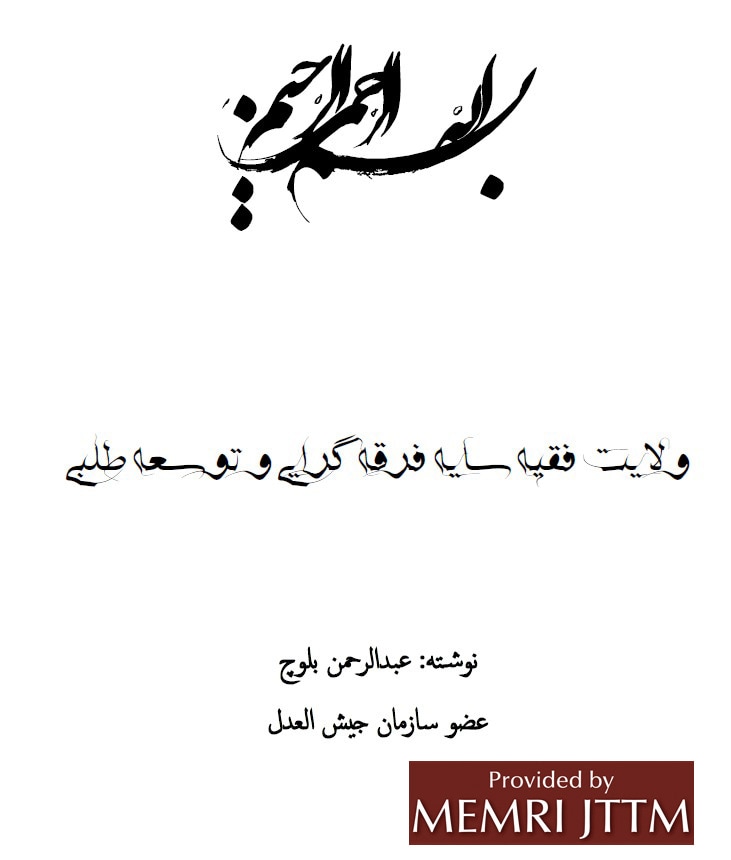The following report is now a complimentary offering from MEMRI's Jihad and Terrorism Threat Monitor (JTTM). For JTTM subscription information, click here.
On October 25, 2024, the official website of the Iranian jihadi organization Jaish Al-Adl released a Farsi-language book examining the prevailing system of Shia religious governance in Iran and its destabilization of Sunni Muslims.
Jaish Al-Adl, a group of Baloch and Sunni religious groups in Shi'ite Iran, views its struggle against the government of Iran as jihad, fighting it especially in Baluchestan Wa Sistan province bordering the Balochistan province of Pakistan.
The 175-page book, titled "The Iranian Regime In The Shadow Of Sectarianism And Developmentalism," is written by Jaish Al-Adl member Abdul Rahman Baloch. The book comprises three chapters which discuss and analyze the Iranian government's establishment, motivations, and goals and plans, respectively.

The author describes the Iranian system as Wilayat Al-Faqih, which is late Ayatollah Khomeini's vision of an Islamic government guided by a supreme assembly of Islamic theocratic leaders. A paragraph in the preamble of the book states: "Reading this book will be beneficial for the employees of the security agencies of countries, the statesmen of countries that have diplomatic relations with the Islamic Republic of Iran, think tanks, researchers, and political analysts, professional journalists active in Iran, as well as religious and Muslim leaders who imagine the movements of Iran will revive the Islamic Ummah and also Islamic organizations and regulations."
The book discusses various topics, the most important of which are:
"Recognizing The Authority Of The Wilayat Al-Faqih"
"The Historical Background Of The Establishment Of Wilayat Al-Faqih"
"Explaining The Structure Of The Wilayat Al-Faqih Government"
"Comparing The Power Of The Republic With The Power Of The Akhunds [A Term Used For Religious And Spiritual Leaders In Iran And Afghanistan]"
"The Study Of The Islamic Part Of The Wilayat Al-Faqih System"
"Government Leaders And System Officials Promoting Sectarianism And Fueling Sunni And Shi'ite Differences"
"The Practical Measures Of The Wilayat Al-Faqih System That Have Led To Sectarianism"
"The Expansion Of The Shia-Sunni War After The Establishment Of The Wilayat Al-Faqih Government"
"Iran-Iraq War"
"Victims Of Shia-Sunni Conflict In Pakistan"
"Iraq"
"Syria"
"Lebanon"
"The Establishment Of Military Groups To Occupy Islamic Countries"
"The Effect Of Wilayat Al-Faqih On Sectarianism In Pakistan"
"The Cultural And Soft Supremacy Of Wilayat Al-Faqih Is The Gateway To The Occupation Of Middle Eastern Countries"
"The Government Of Wilayat Al-Faqih And The Palestinian Issue"
"The Conflict Of Interests Of Wilayat Al-Faqih With The West And Israel"
"A Look At The War And Disputes Between The Wilayat Al-Faqih And The West And Israel"
"Strategic Tools"
"Tactical Tools"
The author presents his reasons for each topic, discusses comprehensively, refers to the references, evaluates, and details the goals, policies, and future plans of Iran and the current Iranian government, as well as of the Shia religion. He discusses the religious aspect of Iran's government, along with its politics, and claims Iran's action contradicts its speech.
One part of the book reads says: "Basically, the government of the Islamic Republic of Iran is not an Islamic government, but a Shia government, because its founding principles are exclusive to the Twelver Shia religion, which is a special official religion instead of Islam, and its lofty goals are to spread as Twelver Shia instead of Islam in the world."
The Twelver Shi'ism, also known as Imamiyah, is a sect in Shias that the government of Iran follows.
A PDF copy of the book was shared on Telegram
The book also discusses the religious traditions and beliefs of the Shias, saying they are opponents of Ahl-e-Sunnat (i.e., Sunni Muslims) who spread strife in the Islamic Ummah who do not correctly follow Islam.
Citing Quranic verses and hadiths (traditions of Muhammad) as well as notable books of past Islamic jurists, the author seeks to refute the policies and actions of Shias. He also discusses the political and religious leaders of Iran such as late Ayatollah Khomeini and his successor Ayatollah Khamenei, accusing these leaders of creating differences between Shias and Sunnis. The book regularly cites the writing of Shia religious leaders. In general, the book is about Iran's government, the government's religion and its policies, its negative effects on the region, and its hypocrisy. The author says that Iran has set its policies to destabilize the region and has created proxy groups as well as intellectual and cultural centers.
Source: Telegram, October 25, 2024.





